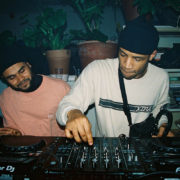Get Rich or Die Trying

Words by: Andy Djaba
Dissecting the inherent contradiction which exists between Hip-Hop’s infatuation with opulent wealth and the genre’s roots in Black political consciousness
Jay Z’s annual pre-Grammys soirée, the Roc Nation Brunch, tends to spark conversation amongst the online Black community as our timelines are inundated with images of this gathering of Hip-Hop’s elite. Thankfully, we were spared the videos of “motivational” pontificating from the likes of Kevin Hart this year, as the brunch was cancelled for obvious reasons. Whilst the #Goals???? tweets from ‘Dinner with Jay Z’ Twitter will have to wait until next year, the repetitive discourse surrounding the brunch still highlights an interesting conundrum facing the Hip-Hop community as the genre continues to evolve.
Before we delve any further, a brief Hip-Hop history lesson. The genre’s roots can be found in the Black political consciousness of the 1960s’ Civil Rights and Black Power movements. With these social movements successfully countered by the state by the 1970s, those seeking to express Black nationalism turned to two characteristically Black art forms – poetry and jazz. These eventually influenced the genesis of Hip-Hop. Hence, Black empowerment, Afrocentrism and Black mobilisation have been deeply embedded within Hip-Hop since its inception. As the genre expanded in the 1980s, with the Reagan administration’s policies devastating Black communities, conscious Hip-Hop represented a means to oppose the state and raise awareness.
Jay Z and Diddy didn’t come up until the mid-to-late 1990s, but both can be credited with transforming the entire landscape of Black corporate ownership within Hip-Hop. Their respective successes with Roc-A-Fella and Bad Boy signalled the beginning of a new era and mentality in Hip-Hop. Their understanding that the true value of the music lay in Hip-Hop artists’ ability to be cultural leaders and global trendsetters meant that, together, they made Hip-Hop not only about selling records, but also about selling Black culture. Coupling this with their penchant for foreign clothes and cars, champagne and yachts, shiny suits and icy chains sparked Hip-Hop’s love affair with capitalism in earnest, and there has been no turning back ever since.
On ‘Family Feud’, the sixth track from his 2017 album 4:44, Jay Z raps: “What’s better than one billionaire? Two… especially if they’re from the same hue as you…”. This emphasis on Black ownership within capitalist structures succinctly summarises the prevailing sentiment in Hip-Hop today and was echoed by Diddy last year when he called for “artists to take back control” in his Icon Award acceptance speech. Needless to say, calls for Black economic empowerment from influential figures within Hip-Hop, like Nipsey Hussle before he was tragically murdered, are all well and good. However, it doesn’t take much for the apparent disingenuity behind this positive development to be called into question.
Diddy himself faced criticism from rapper Mase for his incessant preaching whilst simultaneously continuing to own his masters. Of course, the predatory nature of the music business, particularly in signing young Black people to terms likened to “slave contracts”, is not unique to American Hip-Hop (UK drill rapper Russ springs to mind), nor is it anything new. However, proponents of Black capitalism too often overlook the fact that capitalism is a fundamentally white supremacist venture, and, in practice, Black capitalism too often translates to Black exploitation.
Black ownership alone doesn’t equate to racial equality or liberation and therein lies the problem with Hip-Hop and, by extension, the Black community being overly enamoured with the notion of Black capitalism. With recognising the importance of being adequately compensated for artistic and creative output, inevitably comes the risk of sacrificing social, cultural and artistic integrity in exchange for capital. If more attention isn’t paid to reimagining the music industry as more equitable for the creatives involved, Hip-Hop runs the risk of being completely and irreversibly whitewashed.





![ZINO VINCI’S ‘FILTHY & DISGUSTING’EP BRINGS YOU TO THE CORE OF THE ARTIST [@ZinoVinci]](https://guap.co/wp-content/uploads/2023/10/Zino-4.jpg)




